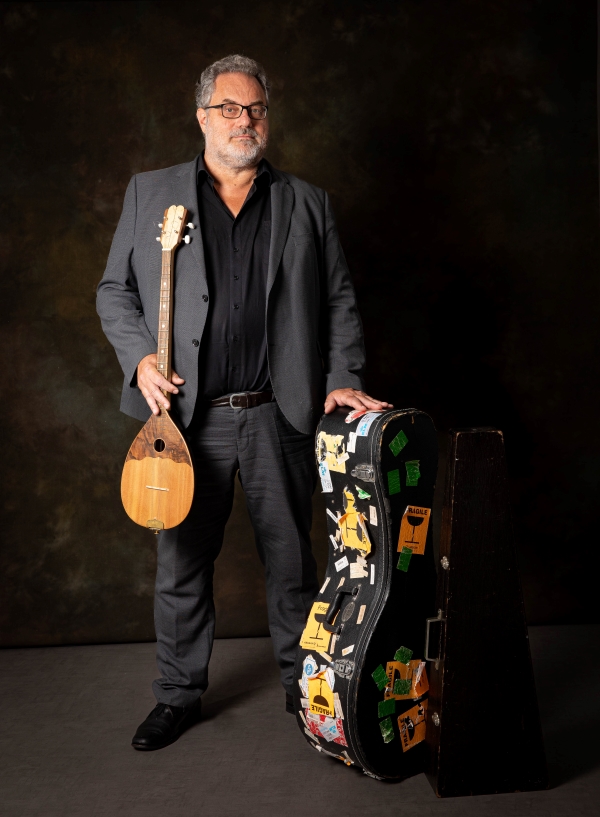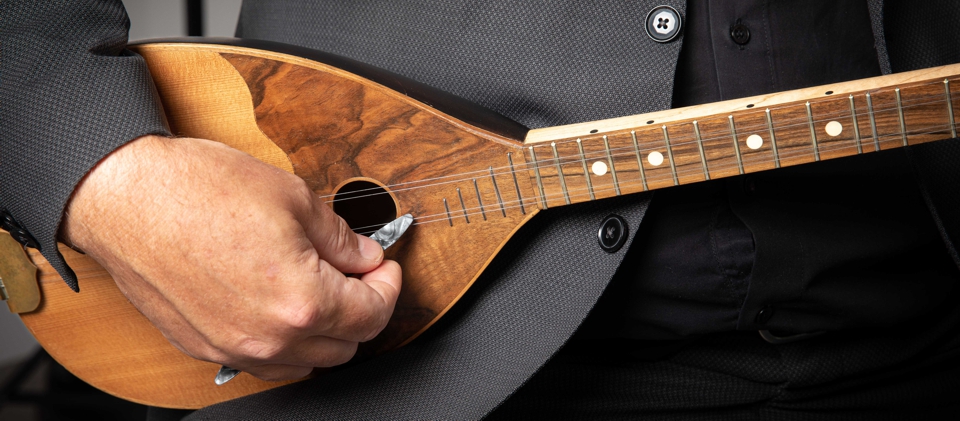Michiel van der Meulen
loves thinking wondering learning making travelling meeting music Earth and the ones he loves
In short – Michiel van der Meulen (Utrecht, 1969) is composer of contemporary modal music, whose work is primarily based on the modes, rhythms and forms of Ottoman art music and Eastern Mediterranean folk traditions. He is an apprentice of Ross Daly. Michiel records his work with the occassional ensemble Kairos Collective and releases it on his personal label TouMilou.
Alnadi Podcast | بودكاست النادي | EP115 (19 May 2024)
Life
Michiel van der Meulen was released into the world in 1969, from school in 1988 (… with a diploma and his muse and future wife), by the army in 1989 (… with a truck driver’s license and skills he fortunately never needed to rely on), and from university in 1999 (… with two more diplomas, and skills he relied on ever since). He works as a geologist for the Geological Survey of the Netherlands and is married with two children. Michiel is a mostly self-taught musician, having received training on the violin in his childhood and in composition later in life.
Music
Journey – After a life-long immersion in various modal idioms—during his upbringing, as a musician and as a traveller—Michiel found his musical voice at Labyrinth Musical Workshop in Crete, studying composition with Ross Daly. This is where he learned to shape the modes, rhythms, forms and phrasing he had been absorbing, especially those of the Ottoman classical and Eastern Mediterranean folk repertoires, into contemporary modal music, a cosmopolitan genre coined by Daly. Michiel develops his work as an ever more comprehensive reflection on his influences and personal musical journey, as documented in the combined technical / biographic notes to his albums.
Approach – Michiel mostly uses his oud when composing, and sometimes his violin or the modified Macedonian tambura that features in several of his recordings. He is an avid user of Mus2, software designed specifically for the notation of microtonal music. His work is primarily instrumental, but he is open to cooperate with songwriters and lyricists.
Kairos Collective – When Michiel records his work, he’ll assemble an occassional ensemble named after the ancient Greek mythological personification of the right moment, the time to act or an opportunity to be seized. The name Kairos encapsulates the spirit and atmosphere of a collective that is as ephemeral as its defining traits. Nothing is fixed, there are no strings attached, but even so you’ll hear they are consistent and rock-solid.
Science
Analogies – Michiel experiences art and science as mutually reinforcing factors in his life, and approaches them in much the same way. Both are sparked by inspiration, imagination and curiosity, and instill a sense of wonder. Both are at the same time demanding and fulfilling, personal and selfless, individual and communal, quirky and orthodox, intuitive and rigorous, which tells you that opposites are not necessarily dichotomous – just like art and science themselves in general. Composition and geology in particular both require you to explore unseen, unheard and unknown worlds. And, most importantly, time and timing are everything.
Intersections – Michiel supported Belgian jazz saxophonist Nathan Daems in developing a geology theme for the Black Flower album Magma (2022) and concert tour Nanokosmos (2023). Earlier involvements with the conceptual artworks Sand in the Netherlands (2021) by Lara Almarcegui and The Intimate Earthquake Archive (2016) by Sissel Marie Tonn made Michiel aware of how art in general can help people grasp some of the complex or even controversial matters he deals with at work. And lest we forget – one of the line-ups of Kairos Collective originated from a work event, affirming a connection between geology and music established in Michiel’s early youth. Also in that sense, music is life.
Personal releases
- Ariadne / TouMilou #8, 2024 / live EP
- Traditionele Turkse kunstmuziek (Traditional Turkish art music) / TouMilou, 2023 / book
- Ripplets / TouMilou #7, 2023 / single
- Erato / TouMilou #6, 2022 / album
- Európe / TouMilou #3, 2019 / album
- Pîrî Reis / TouMilou #1, 2017 / album
- Future work
Photo: Geerke Vermeulen (Click on image for more)
Cooperation
East – Ever since he started out at Labyrinth, Michiel has enjoyed the great privilege to not only learn from but also work with renowed musicians and technicians from a uniquely close-knit community:
- Fadil Al Turki – IT professional, musician, podcast producer | Alnadi podcast
- Vangelis Apostolou – sound engineer | Pîrî Reis, Európe, Unforgotten, Üçayak, Erato, Ripplets, Ariadne
- Christos Barbas – musician, composer | Ariadne
- Ross Daly – musician, composer, educator, founder and director of Labyrinth Musical Workshop | Erato
- Jurrie Eilers – guitarist, web designer | Ano Kato, TouMilou and Balkanika websites
- Taxiarchis Georgoulis – oud player | Európe, Erato, Ariadne
- Manolis Kanakakis – kanun player, pianist, choir director | Pîrî Reis, Európe, Erato
- Vagelis Karipis – percussionist | Európe, Erato
- Dimitris Karnachoritis – bağlama player | Ripplets
- Marijia Katsouna – percussionist | Pîrî Reis, Európe, Erato
- Nikos Kokolakis – composer, musician | Unforgotten project, Üçayak project, Európe project
- Nikos Kollias – sound engineer | Európe, Erato
- Michalis Kouloumis – violinist, composer | Erato
- Harris Lambrakis – ney player | Pîrî Reis, Európe, Erato
- Danai Loukidi – violinist, composer | Ripplets
- Yorgos Mavromanolakis (†) – oud player, composer | Pîrî Reis
- Alexandros Papadimitrakis – oud player, lavta player | Erato
- Giorgos Papaioannou – violinist, composer | Pîrî Reis, Európe, Erato, Ariadne
- Nikos Papaioannou – cellist, bass guitarist | Európe, Erato, Ariadne
- Nikos Paraoulakis – ney player, composer, sound engineer, producer | Erato
- Vassilis Philippou – composer, musician | Unforgotten project, Üçayak project, Európe project
- Pavlos Spyropoulos – double bass player, arranger | Ripplets, Ariadne
- Kelly Thoma – lyra player, composer | Erato
- Sergios Voulgaris – percussionist, educator | Erato project, Ariadne
- Magnus Robb – musician, composer, sound engineer | Európe project, Unforgotten project
- Mayu Shviro – cellist | Erato
West – In his home country, Michiel cooperates with or has been influenced by:
- Kamil Abbas – musician, singer | Čalgija III
- Cengiz Arslanpay – ney player, composer, sound artist | Unforgotten project, Üçayak project, Traditionele Turkse kunstmuziek, Erato project
- Remco Busink – schoolteacher, luthier, musician | Jamas, microtonal tambura
- Dominy Clements – composer, flautist | Jamas, Európe project, Unforgotten project, Üçayak project, Erato project
- Thijs de Melker – musician, producer, composer | Unforgotten, Üçayak
- Wil Hesen – sound engineer | Unforgotten, Üçayak
- Bernard Kleikamp – publisher, record company owner, ethnomusicologist | Unforgotten project, Üçayak project
- Michiel Koperdraat – singer, bouzouki player, oud player | Ano Kato
- Andy Leeming – percussionist | Ano Kato
- Crispijn Oomes – violin player, impressario | Jamas, Unforgotten, Üçayak, Traditionele Turkse kunstmuziek, Čalgija III
- Udo Pannekeet – sound engineer, bassist | Erato project
- Roelof Rosendal (†) – musician | Jamas, Unforgotten, Üçayak
- Roel Sluis – singer, instrumentalist | Európe, Unforgotten, Üçayak, Traditionele Turkse kunstmuziek, Čalgija III
- Wouter Swets (†) – musician, ethnomusicologist, author | Vintage Recordings (1964–1966), Unforgotten, Üçayak, Traditionele Turkse kunstmuziek
- Jacobus Thiele – percussionist | Erato
- Nik Trabucho – graphic designer, illustrator, cartographer| Traditionele Turkse kunstmuziek
- Roland van Abel – information manager, string player, mecenas | Unforgotten project, Üçayak project, Traditionele Turkse kunstmuziek, Čalgija III
- Albert van der Meulen – palaeontologist, accordionist | Jamas, Vintage Recordings (1964–1966), Európe
- Martine van der Meulen – singer, muse | Jamas, Čalgija III
- Theo van Halen – clarinettist | Ano Kato
- Jan Wollring – geodesist, accordionist, dance repetitor | Erato, Čalgija III
Čalgija productions
It is hard to overstate the role Čalgija and the ensemble’s musical director Wouter Swets (1930–2016) played in building a Dutch audience for ‘world music’, in particular music from the Balkans and Anatolia.
Wouter Swets has been called the Dutch Alan Lomax but perhaps it is more accurate to think of him as an equivalent of Ross Daly. It was Swets who drew Michiel’s father Albert to Balkan music, the closest match in Europe to the sounds of an early youth spent in the Dutch East Indies. It provided him a way out of the rather dire musical environment he had found himself in after moving to the Netherlands. Čalgija, in its 1960s line-up, was Albert’s first ensemble. Michiel has played and still plays with former Čalgija members, so it is fair to say that Swets shaped, albeit mostly indirectly, Michiel’s musical tastes and preferences.
Čalgija existed, in different line-ups, from the early 1960s till 1995, and then continued as Al Farabi till the mid-2000s. Swets was primarily active as a musician and researcher; his discography is comparitatively modest. Čalgija produced an untitled EP in the mid-1960s that was reisssued by TouMilou, an LP in 1978 and a CD in 1991. Ensemble Al Farabi released a CD in 2002.
Michiel learned that there was unreleased studio material from 1981 and 1984/85, and decided, out of curiosity and respect, to find and release it, adding two full albums to Čalgija’s musical legacy. All of their unpublished studio recordings have now been (un)covered and most of the material has been published, along with the best of the concert recordings we have so far identified and digitized.
Releases on TouMilou (2017–2021)
- Üçayak / TouMilou #5, 2021 / album
- Unforgotten / PAN 2056 / TouMilou #4, 2020 / album
- Vintage recordings (1964–1966) / TouMilou #2, 2017 / EP
Vintage albums (1966–1995)
- Mosaique Vivant / MV695, 1995 / compilation album with three tracks by Čalgija
- Music from the Balkans and Anatolia #2 / PAN 2007CD, 1991 / album
- Music from the Balkans and Anatolia #1 / MU 7425, 1978 / PAN 7425, 2013 / album
- Balkan Orchestra Čalgija / Terpsichoré, 1966 / EP, reissued as TouMilou #2
Čalgija CD sales revenues are transferred to the estate of Wouter Swets and used to cover the expenses of a continued effort to safeguard his musical legacy. TouMilou Music contributes to this effort on a pro bono basis.



